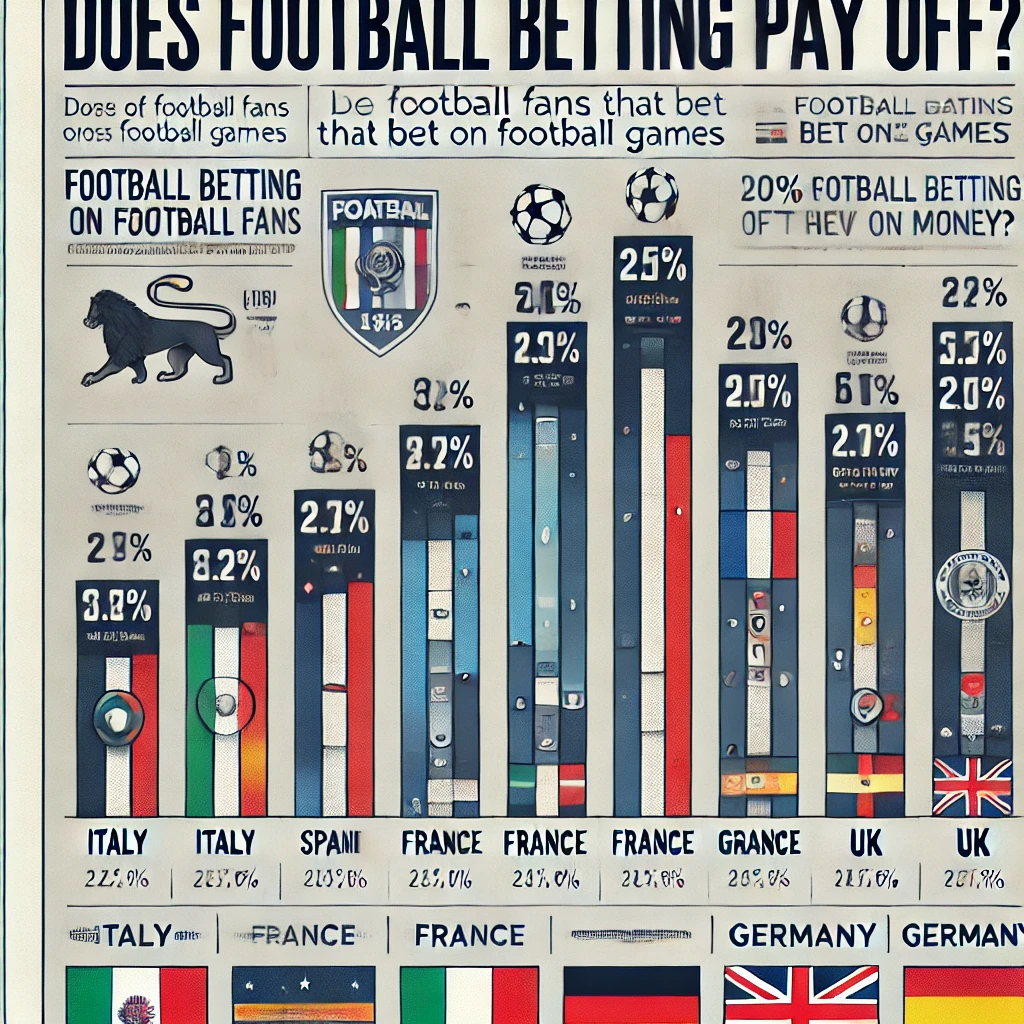“Football Betting: Comprehensive Guide, Strategies, and Insights for Success”2024
Football Betting: A Comprehensive Guide to the Global Phenomenon
Table of Contents
“Football Betting: Comprehensive Guide, Strategies, and Insights for Success”.Football betting is a thriving industry that has become deeply ingrained in the global sporting culture. Fans from every corner of the world engage in football betting, hoping to turn their passion for the sport into profits. The industry’s growth is driven by the sheer popularity of football, which is watched by billions across continents, from casual fans to die-hard supporters.
This article will explore the history, dynamics, types of bets, the psychology behind football betting, and the effects of this growing phenomenon. We’ll also discuss how football betting fits into the modern sports landscape, the challenges it poses, and the future direction of the industry.

Table of Contents:
- The Origins of Football Betting
- Evolution of sports betting
- Early football betting markets
- Growth and regulation
- The Global Popularity of Football Betting
- Key markets around the world
- Economic impact of football betting
- The role of technology in expanding the betting audience
- Types of Football Bets
- Match outcome (1X2 betting)
- Asian handicap betting
- Over/Under goals market
- Player and team-specific bets
- Accumulators and combo bets
- Live betting and cash-out options
- The Psychology Behind Football Betting
- The allure of risk-taking
- Emotional connection to teams
- The influence of cognitive biases
- The role of superstition and luck
- Football Betting and its Influence on Sports Culture
- Media and advertising
- Sponsorship deals and their impact on clubs
- Match-fixing and its implications
- Risks and Challenges
- Problem gambling and addiction
- Ethical concerns and regulations
- The role of responsible betting practices
- The Future of Football Betting
- Emerging technologies (AI, blockchain, VR)
- Mobile betting apps and the rise of micro-betting
- The legalization of sports betting in new markets
1. The Origins of Football Betting
Evolution of Sports Betting
Betting on sports has ancient roots, with evidence of gambling going back to ancient Rome and Greece, where wagers were placed on chariot races and gladiator contests. Over time, as organized sports grew, so did the practice of betting on outcomes, particularly in popular sports like boxing, horse racing, and, eventually, football.”Football Betting: Comprehensive Guide, Strategies, and Insights for Success”
Early Football Betting Markets
Football betting began to gain prominence in the late 19th century, as the modern form of the sport was established. In the UK, where football was first codified, fans began placing informal bets on match outcomes. The earliest formal football betting markets were largely controlled by bookmakers, who would offer odds on upcoming matches. These markets were informal at first but gradually became more organized as football grew in popularity.”Football Betting: Comprehensive Guide, Strategies, and Insights for Success”

In 1923, the first official football pool, known as “The Littlewoods Football Pools,” was launched in the UK, where bettors would attempt to predict the results of multiple matches for the chance to win substantial prizes. This system became popular across Britain and influenced football betting culture worldwide.
Growth and Regulation
With the rise of football as the world’s most popular sport, the demand for football betting soared. The introduction of online betting platforms in the late 1990s and early 2000s transformed the industry, making it easier for fans to bet on matches from their smartphones and computers. This shift also led to the development of more sophisticated betting markets and types of bets.”Football Betting: Comprehensive Guide, Strategies, and Insights for Success”
However, with this growth came the need for regulation. Governments around the world, particularly in Europe, began introducing strict rules to ensure fair play and minimize the potential for match-fixing and corruption. Some regions, like the UK, created licensing systems for bookmakers to ensure transparency and protect bettors. Other countries, such as the United States, had much stricter regulations, with sports betting only becoming widely legalized in recent years due to changing attitudes and legal battles.
2. The Global Popularity of Football Betting
Key Markets Around the World
Football betting is particularly popular in Europe, where the sport enjoys a fervent following. The UK, Spain, Italy, and Germany boast some of the largest football betting markets in the world, thanks to the presence of top-tier leagues like the Premier League, La Liga, Serie A, and the Bundesliga.
In Asia, football betting is also growing rapidly, particularly in countries like China, Singapore, and Malaysia. Despite some strict gambling laws in many Asian countries, football betting has found a home in regulated markets, with regional leagues and international tournaments attracting huge numbers of bettors.
Africa is another region where football betting is booming, particularly in countries like Nigeria, Kenya, and South Africa, where sports betting apps and websites have become a popular way for fans to engage with the game.
Economic Impact of Football Betting
Football betting has a significant economic impact on both local and global economies. In the UK alone, sports betting generated billions of pounds in revenue, with football betting making up a substantial portion of that figure. This revenue comes not only from bookmakers but also from associated industries like advertising, sponsorship, and media.”Football Betting: Comprehensive Guide, Strategies, and Insights for Success”
In countries where football betting is heavily regulated, governments benefit from taxation on the profits of betting companies, providing funds for public services and infrastructure projects.
The Role of Technology in Expanding the Betting Audience
The widespread availability of smartphones and high-speed internet has revolutionized football betting. In the past, bettors had to physically visit betting shops or use telephone services to place their bets. Today, bettors can access a wide range of markets and place bets in real-time through mobile apps, which have made betting more convenient and accessible to millions of users globally.
The advent of live betting (in-play betting), where users can place bets as the game unfolds, has been particularly transformative. Bettors can now react to the action in real-time, further blurring the lines between watching and wagering.”Football Betting: Comprehensive Guide, Strategies, and Insights for Success”
3. Types of Football Bets
Football betting offers a wide range of betting options, catering to both novice and experienced bettors. Here are some of the most common types of bets:
Match Outcome (1X2 Betting)
One of the simplest and most popular types of football bets is the 1X2 bet, also known as the match result bet. In this market, bettors wager on whether the home team (1) will win, whether the match will end in a draw (X), or whether the away team (2) will win.
Asian Handicap Betting
Asian handicap betting is a form of football betting designed to eliminate the possibility of a draw, giving one team a virtual handicap to level the playing field. This type of betting is particularly popular in Asia but has gained popularity globally due to its simplicity and higher odds.”Football Betting: Comprehensive Guide, Strategies, and Insights for Success”

Over/Under Goals Market
In the over/under goals market, bettors wager on whether the total number of goals scored in a match will be over or under a predetermined number set by the bookmaker. For example, if the line is set at 2.5 goals, bettors can place a wager on whether the game will have more or fewer than 2.5 goals.
Player and Team-Specific Bets
Bettors can also place bets on individual player performance, such as who will score the first goal or how many goals a specific player will score. Team-specific bets, like the number of corners or yellow cards a team will receive, also add a layer of excitement to betting markets.
Accumulators and Combo Bets
Accumulators (also known as parlays) involve combining multiple bets into one, with the potential for larger payouts if all bets in the combination are correct. For instance, a bettor might wager on the outcome of five different matches, and all five selections must be correct to win.
Live Betting and Cash-Out Options
Live betting, also known as in-play betting, allows bettors to place bets on a game while it’s happening. This dynamic form of betting has grown immensely with the rise of online platforms, enabling bettors to make decisions based on the flow of the game.
Many bookmakers also offer cash-out options, allowing bettors to close a bet before the game ends to secure a profit or minimize losses, depending on how the game is progressing.
4. The Psychology Behind Football Betting
The Allure of Risk-Taking
For many football bettors, the appeal of betting lies in the thrill of taking risks and the potential for rewards. The prospect of turning a small wager into a significant sum of money can be highly enticing, particularly when betting on underdogs or long-shot outcomes. Risk-taking is also tied to the human brain’s reward system, where dopamine, a neurotransmitter associated with pleasure, is released when a positive outcome (like winning a bet) occurs.
Emotional Connection to Teams
Football fans often have deep emotional connections to their favorite teams, which can significantly impact their betting decisions. Many fans place bets on their favorite teams, not just for profit but to enhance their sense of involvement in the game. This emotional investment can, however, cloud judgment and lead to poor betting decisions driven by passion rather than logic.
The Influence of Cognitive Biases
Cognitive biases often play a significant role in football betting. Some of the most common biases include:
- Confirmation Bias: Bettors may seek information that supports their preconceived notions about a team or match outcome, leading them to place biased bets.
- Recency Bias: Bettors might overemphasize recent performance trends while ignoring the broader context, such as injuries or overall team quality.
- The Gambler’s Fallacy: This is the mistaken belief that past outcomes (such as a team losing several games in a row) will affect future outcomes, leading bettors to believe a “win is due.”
The Role of Superstition and Luck
Superstition often plays a role in the decision-making process of football bettors. Many fans believe in lucky rituals







